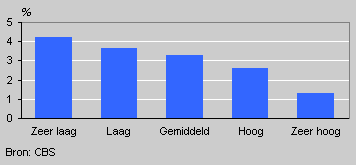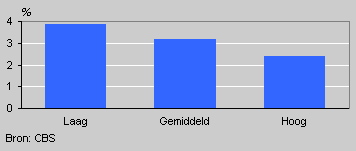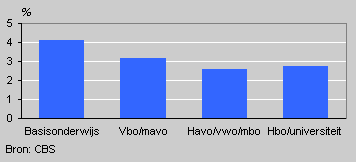Clever at school, successful on the labour market

Intelligent school-leavers find a job more easily than those who are less bright, even when they have the same diplomas. In senior vocational education (mbo), graduates who enjoyed going to school found a job more easily than those who did not enjoy school.
This can be concluded from the results of a recent survey held by the research centre for education and labour market (ROA) and Statistics Netherlands.
Fewer unemployed among people with high IQ
On the basis of Secondary education 1989 cohort survey the study looked at which school-leavers from mbo level education had a job one and a half years after receiving their diploma, and which did not.
Intelligence determines to a certain extent school-leavers’ chances on the labour market. Intelligence is measured by a test taken by all pupils in the first year of secondary education. It turned out that mbo students with a low score in the first year of secondary education were considerably more often unemployed after graduation than those with a higher IQ. As IQ rises, the chance of being unemployed becomes smaller. In relative terms, mbo graduates with the highest scores were least likely to be unemployed.
Unemployed mbo graduates by IQ class

Happy schooldays lead to better job chances
In addition to intelligence, children’s perception of school was also a factor in success or failure on the labour market. Mbo school-leavers who did not enjoy going to school were most likely to be unemployed. The more positive the ex-students were about their schooldays, and about the point of going to school, the less likely they are to be unemployed.
Unemployed mbo graduates by perception of school

Low educated parents, higher risk of unemployment
The education level of parents also partly determines that of their children: The higher the parents’ level of education is, the higher that of their children will be. However, compared with IQ and perception of school, parents’ level of education hardly has any extra effect on the labour market success of their children.
It makes hardly any difference for their children’s chances on the labour market whether parents have a university degree or only the lowest level of secondary education. Only for mbo graduates whose parents have only primary level education is it significantly more difficult to find a job. Children of parents with lower educational levels are slightly more likely to be out of a job than others.
Unemployed mbo graduates by father’s level of education

Tanja Traag